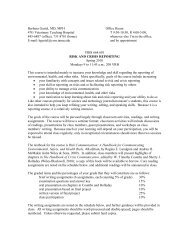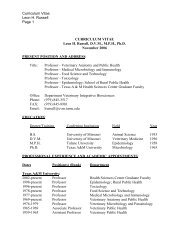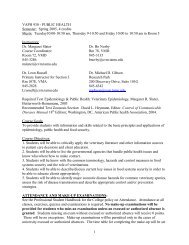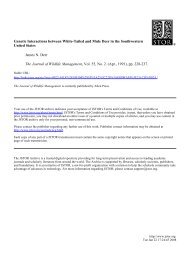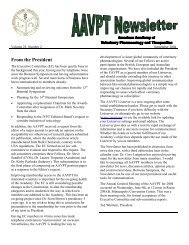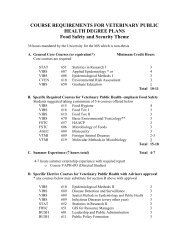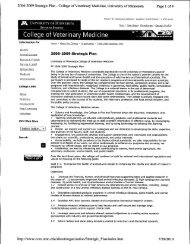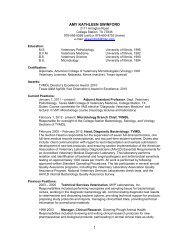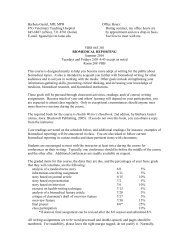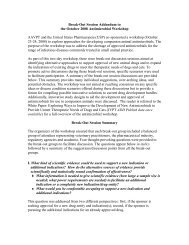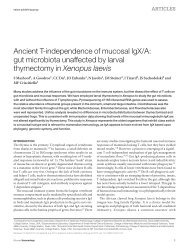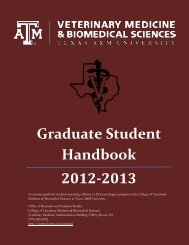Disaster - College of Veterinary Medicine - Texas A&M University
Disaster - College of Veterinary Medicine - Texas A&M University
Disaster - College of Veterinary Medicine - Texas A&M University
Create successful ePaper yourself
Turn your PDF publications into a flip-book with our unique Google optimized e-Paper software.
Location, location, location. This<br />
may be the mainstay for prime real<br />
estate, but it also can apply to the alma<br />
mater <strong>of</strong> the majority <strong>of</strong> <strong>Texas</strong> licensed<br />
veterinarians and the state’s pr<strong>of</strong>essional<br />
veterinary organization. Knowledgeable<br />
experts and classroom facilities<br />
also provide a favorable location to<br />
present continuing education lectures.<br />
That is why in the spring <strong>of</strong> every<br />
year the <strong>Texas</strong> A&M <strong>University</strong> <strong>College</strong><br />
<strong>of</strong> <strong>Veterinary</strong> <strong>Medicine</strong> & Biomedical<br />
Sciences (CVM) partners with the<br />
<strong>Texas</strong> <strong>Veterinary</strong> Medical Association<br />
(TVMA) to host the TVMA Annual<br />
Conference in <strong>College</strong> Station, <strong>Texas</strong>.<br />
“A vast majority <strong>of</strong> our members<br />
graduated from <strong>Texas</strong> A&M. There<br />
is something special about getting<br />
OOne communication mission <strong>of</strong> the<br />
<strong>Texas</strong> A&M <strong>University</strong> <strong>College</strong> <strong>of</strong> <strong>Veterinary</strong><br />
<strong>Medicine</strong> & Biomedical Sciences<br />
(CVM) is to provide animal health<br />
educational opportunities for the local<br />
community. The Second Annual Beef<br />
Cattle Meeting and the Second Annual<br />
Equine Evening at the Expo were two<br />
such events made available to area beef<br />
producers and horse enthusiasts. These<br />
events addressed key issues affecting<br />
beef production as well as equine<br />
health and technological advances.<br />
The 2nd Annual Beef Cattle Producers<br />
Meeting, held April 29, provided<br />
a platform for informative and timely<br />
topics for livestock producers. The<br />
two-hour meeting at the Brazos Expo<br />
Center featured presentations from<br />
clinical faculty and invited speakers on<br />
topics, which producers could implement<br />
in their cattle operations.<br />
Dr. John Davidson, clinical assistant<br />
pr<strong>of</strong>essor <strong>of</strong> large animal clinical<br />
sciences, chaired the meeting and<br />
presented the topic, “Trichomoniasis-<br />
The Impact on Herd Health and Productivity”.<br />
Beef producers also heard<br />
Dr. Jason Cleere, associate pr<strong>of</strong>essor<br />
and extension beef cattle specialist,<br />
discussed “Maximizing the Potential <strong>of</strong><br />
Your Calf Crop”. A historically timely<br />
topic, “Pregnancy Diagnosis in Cattle:<br />
Why is it so Important?” was presented<br />
by Dr. Juan Romano, associate pr<strong>of</strong>essor<br />
at the CVM.<br />
“It is always very rewarding to speak<br />
to a group <strong>of</strong> livestock producers that<br />
our initial veterinary education here<br />
and then coming back home for our<br />
CE,” notes Dr. Lori Teller, President<br />
<strong>of</strong> TVMA and a CVM graduate. “We<br />
also enjoy the time we get to spend<br />
with each veterinary class and love to<br />
interact with future colleagues. TVMA<br />
greatly appreciates our continued<br />
relationship with the CVM and looks<br />
forward to every visit we spend there.”<br />
The 2010 TVMA Annual Conference,<br />
held March 5–7 at the CVM,<br />
provided licensed veterinarians and<br />
their support staff a choice <strong>of</strong> quality<br />
lectures. Topics covered medical<br />
diseases and concerns for companion<br />
animals, food animals, horses, and<br />
cervids (deer, elk, and moose). Speakers<br />
from the <strong>Texas</strong> <strong>Veterinary</strong> Medical<br />
<strong>College</strong> News<br />
TVMA Annual Meeting held at CVM in March<br />
have such an interest in learning and<br />
making improvements in their operation,”<br />
notes Davidson. “In addition to<br />
producer education, a key goal <strong>of</strong> this<br />
meeting was to increase awareness <strong>of</strong><br />
our clinical services, faculty, and talented<br />
staff to area beef producers.”<br />
While the Beef Cattle Meeting was<br />
organized by the CVM, An Equine<br />
Evening at the Expo, held March 23,<br />
was a joint effort <strong>of</strong> the CVM, the <strong>Texas</strong><br />
A&M <strong>University</strong> Department <strong>of</strong> Animal<br />
Science Equine Section, and the<br />
Brazos Extension Horse Committee.<br />
This meeting was organized to educate<br />
equine owners and enthusiasts residing<br />
in the greater Brazos Valley area.<br />
Guest speaker, Dr. Katrin Hinrichs,<br />
Patsy Link Chair in Mare Reproductive<br />
Studies and pr<strong>of</strong>essor <strong>of</strong> both veterinary<br />
physiology & pharmacology and<br />
large animal clinical sciences, gave<br />
a presentation entitled “Horse Cloning—State<br />
<strong>of</strong> the Art.”<br />
Hinrichs noted technological<br />
advances that now promote cloning as<br />
a viable means to preserve for future<br />
breeding generations the equine genetics<br />
<strong>of</strong> great competitive horses that<br />
are <strong>of</strong>ten gelded before their athletic<br />
prowess can be discovered. Hinrich explained<br />
that cloning is also a powerful<br />
research tool which can help scientists<br />
find cures for equine diseases by isolating<br />
and studying the effects <strong>of</strong> genetics<br />
and environment.<br />
Other equine health topics discussed<br />
included “Piroplasmosis and Your<br />
Diagnostic Lab (TVMDL) presented<br />
information to help practitioners in<br />
their diagnosis <strong>of</strong> toxins and endocrine<br />
imbalances. The TVMDL director,<br />
Tammy Beckham, discussed diagnostic<br />
technologies for veterinary laboratories<br />
<strong>of</strong> the future.<br />
The business side <strong>of</strong> veterinary<br />
medical practice featured discussions<br />
on developing, growing and buying/<br />
selling a veterinary practice as well as<br />
practice management.<br />
Ellen Forsythe, TVMA director <strong>of</strong><br />
education and meetings, said that the<br />
conference registrants included 341<br />
DVMs, 35 veterinary students, and 92<br />
hospital personnel. Two hundred sixtyeight<br />
TAMU DVM graduates attended<br />
the TVMA Conference this year.<br />
Producers Meetings provide educational opportunities<br />
Horse-What You Need to Know” and<br />
“Ho<strong>of</strong> Trimming Fundamentals.”<br />
Dr. Tracy Norman, clinical assistant<br />
pr<strong>of</strong>essor, large animal clinical<br />
sciences, presented information on<br />
piroplasmosis, a tick-borne protozoal<br />
infection <strong>of</strong> horses that presents as an<br />
acute infection with fever, decreased<br />
appetite, depression, labored or rapid<br />
respiration, and congestion <strong>of</strong> the<br />
mucus membranes among other symptoms.<br />
She noted that carrier animals<br />
or infected ticks can introduce equine<br />
piroplasmosis into new regions and<br />
this disease is a major constraint to the<br />
international movement <strong>of</strong> equines.<br />
Jason Maki, CJF, RJF, farrier at the<br />
<strong>Veterinary</strong> Medical Teaching Hospital,<br />
presented information on the fundamentals<br />
<strong>of</strong> equine ho<strong>of</strong> trimming.<br />
Maki noted that properly trimmed<br />
hooves keep a horse’s feet more sound<br />
and decrease long-term problems.<br />
From beef herd health practices to<br />
fundamental training and new scientific<br />
technology, the subject matter<br />
presented to local beef cattle producers<br />
and equine enthusiasts addressed<br />
current industry issues and techniques.<br />
Educational opportunities such as<br />
these provide area livestock owners<br />
with valuable information they can use<br />
to help improve their cattle and horse<br />
operations.<br />
CVM Today • Summer 2010 • 25



